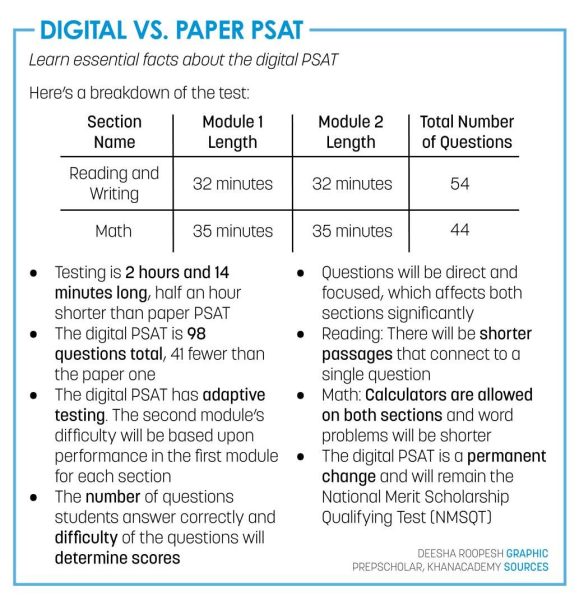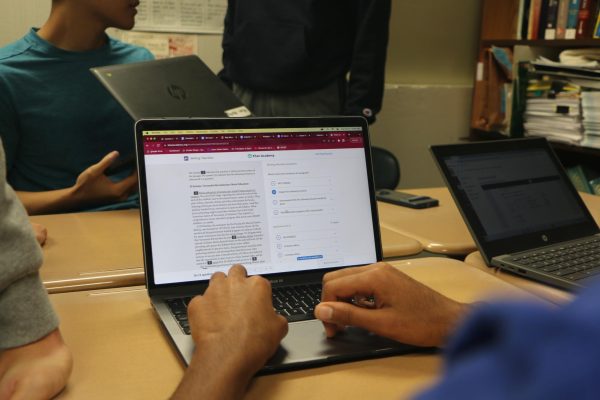The Preliminary SAT/National Merit Scholarship Qualifying Test (PSAT/NMSQT), PSAT 10, and PSAT 8/9 are all following the trend of technological integration. On Oct. 19, many students at this school will be taking their grade-specific version of the PSAT on their Chromebook instead of with a test booklet and pencil.
According to College Board, the digital PSAT was created so “students who will be taking the SAT as juniors in the spring of 2024 have an opportunity to familiarize themselves with the digital testing experience before taking the digital SAT.”
In addition, all versions of the PSAT have had format changes. The test has been shortened and is now adaptive instead of standardized, meaning that performance in an early part of the test can influence the difficulty of a later part of the test. The reading and writing sections of the test have been combined and reading passages will be shorter, but only be relevant for a single question. Lastly, the math section will always allow the use of a calculator.
Many students at this school have taken assessments on a computer before, such as the standardized Indiana’s Learning Evaluation and Assessment Readiness Network (ILEARN) test.
Junior Aayush Singh, who has already taken the harder SAT as well as multiple versions of the ILEARN test, said the format changes could improve student performance but will not affect his perception of the difficulty or testing environment of the PSAT.
“I think this format could be better for student performance because many students are now acclimated to working on a digital device,” Singh said. “I don’t know if the positives would outweigh the negatives; it probably would depend on who you ask.”
In a similar vein, sophomore Anjali Prasad said although introducing the digital format to all forms of the PSAT is helpful, she doesn’t feel more or less stressed because of the format.

“For me, I’ll be studying for these tests in the same way through the online Khan Academy course and reviewing old tests. Having taken the PSAT 8/9, I honestly don’t think that the digital format will have any effect on my performance,” Prasad said. “The digital test being provided to freshmen and sophomores might give them a sense of familiarity and comfort during a higher stakes test.”
Director of counseling Rachel Cole, one of the school administrators overseeing PSAT testing, said the digital format will help prevent logistical errors.
Cole said, “It’s definitely nicer for us not to be handing out all those paper materials, dealing with boxed deliveries, boxing them back up, and hoping they don’t get lost. We’ve had a box of paper tests get lost before.”
Assistant Principal Joseph Schaller, another administrator overseeing PSAT testing, said he agreed with Cole that the changes will be a benefit for the administrators guiding operations on test day. He also said there’s a possibility of an even shorter testing period.
“I do think once teachers get used to it that yes, it’ll be easier for them to administer it and it’ll be a pretty easy process. We have cut 50 minutes off the testing time this year and I don’t think it will take the whole time anyways, so after we do it this year we may even shorten it more next year,” Schaller said. “I think going digital has been a good thing. In the past, there would sometimes be issues where the identification stickers on the physical tests were incorrect, but the digital stress testing we did can help address this issue.”
While the changes may decrease logistical issues and be more reflective of the future, Singh said the PSAT doesn’t feel like a tool which motivates students to learn or tests their academic skills.
“I think the standardized tests that College Board has right now are in need of a change but I don’t know if this is the change I want,” Singh said. “I am not a fan of standardized testing in general, and with the PSAT I feel like people spend too much time getting good at the ‘SAT’ questions instead of actually furthering their knowledge and trying to get better at things like reading comprehension and grammar.”
















































































![Review: “The Immortal Soul Salvage Yard:” A criminally underrated poetry collection [MUSE]](https://hilite.org/wp-content/uploads/2025/03/71cju6TvqmL._AC_UF10001000_QL80_.jpg)
![Review: "Dog Man" is Unapologetically Chaotic [MUSE]](https://hilite.org/wp-content/uploads/2025/03/dogman-1200x700.jpg)
![Review: "Ne Zha 2": The WeChat family reunion I didn’t know I needed [MUSE]](https://hilite.org/wp-content/uploads/2025/03/unnamed-4.png)
![Review in Print: Maripaz Villar brings a delightfully unique style to the world of WEBTOON [MUSE]](https://hilite.org/wp-content/uploads/2023/12/maripazcover-1200x960.jpg)
![Review: “The Sword of Kaigen” is a masterpiece [MUSE]](https://hilite.org/wp-content/uploads/2023/11/Screenshot-2023-11-26-201051.png)
![Review: Gateron Oil Kings, great linear switches, okay price [MUSE]](https://hilite.org/wp-content/uploads/2023/11/Screenshot-2023-11-26-200553.png)
![Review: “A Haunting in Venice” is a significant improvement from other Agatha Christie adaptations [MUSE]](https://hilite.org/wp-content/uploads/2023/11/e7ee2938a6d422669771bce6d8088521.jpg)
![Review: A Thanksgiving story from elementary school, still just as interesting [MUSE]](https://hilite.org/wp-content/uploads/2023/11/Screenshot-2023-11-26-195514-987x1200.png)
![Review: "When I Fly Towards You", cute, uplifting youth drama [MUSE]](https://hilite.org/wp-content/uploads/2023/09/When-I-Fly-Towards-You-Chinese-drama.png)
![Postcards from Muse: Hawaii Travel Diary [MUSE]](https://hilite.org/wp-content/uploads/2023/09/My-project-1-1200x1200.jpg)
![Review: "Ladybug & Cat Noir: The Movie," departure from original show [MUSE]](https://hilite.org/wp-content/uploads/2023/09/Ladybug__Cat_Noir_-_The_Movie_poster.jpg)
![Review in Print: "Hidden Love" is the cute, uplifting drama everyone needs [MUSE]](https://hilite.org/wp-content/uploads/2023/09/hiddenlovecover-e1693597208225-1030x1200.png)
![Review in Print: "Heartstopper" is the heartwarming queer romance we all need [MUSE]](https://hilite.org/wp-content/uploads/2023/08/museheartstoppercover-1200x654.png)






Cydni Choate • Oct 26, 2023 at 6:02 am
Your article is out of touch with those who prepared and administered this exam across the country, counselors paid with public funds who spent untold hours with little to no support from College Board. This “non-profit” is making millions by stealing educator time and abusing education funds.